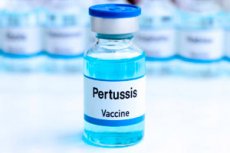New publications
New nasal vaccine shows promise in reducing the spread of pertussis
Last reviewed: 02.07.2025

All iLive content is medically reviewed or fact checked to ensure as much factual accuracy as possible.
We have strict sourcing guidelines and only link to reputable media sites, academic research institutions and, whenever possible, medically peer reviewed studies. Note that the numbers in parentheses ([1], [2], etc.) are clickable links to these studies.
If you feel that any of our content is inaccurate, out-of-date, or otherwise questionable, please select it and press Ctrl + Enter.

Current pertussis vaccines are widely used and effective in preventing the disease, which is caused by the bacteria Bordetella pertussis. However, these vaccines do not clear the upper respiratory tract of bacteria, allowing even vaccinated people to spread the disease.
The new vaccine combines traditional whooping cough antigens with an innovative adjuvant called T-vant, which boosts the body’s immune response, particularly in the airways. In a study published in npj Vaccines, mice immunized intranasally with the new T-vant vaccine showed no signs of bacteria in their lungs and nasopharynx — the area of the upper throat behind the nose — three weeks after infection. However, bacteria persisted in the upper airways of mice given the traditional vaccine intramuscularly.
"By developing a vaccine that can not only protect people but also prevent transmission, we hope to improve existing vaccines and limit the spread of whooping cough in communities," said lead study author Lisa Morici, a professor of microbiology and immunology at Tulane University School of Medicine.
The T-vant adjuvant is derived from bacterial outer membrane vesicles, tiny particles that naturally stimulate the immune system. The study found that the adjuvant elicited a mucosal immune response, activating immune cells in the airways that are critical to preventing bacteria from colonizing the body.
The study also showed no adverse effects on lung tissue following immunization, underscoring the safety of the vaccine.
These findings are significant, especially as cases of whooping cough (pertussis) continue to rise. Recent data from the Centers for Disease Control and Prevention (CDC) showed a fivefold increase in cases of whooping cough in the U.S. compared to last year. The disease affects about 24 million people worldwide each year and primarily affects infants and people with weakened immune systems.
A vaccine that can successfully prevent infection and transmission of whooping cough in people could lay the groundwork for eradicating the disease altogether, said James MacLachlan, a co-author of the study and an associate professor of microbiology and immunology at Tulane University School of Medicine.
"These results highlight the need for improved vaccines that can do more than just protect individuals," McLachlan said. "We need vaccines that can effectively prevent the spread of bacteria in communities, and this new approach is an encouraging step in that direction."
